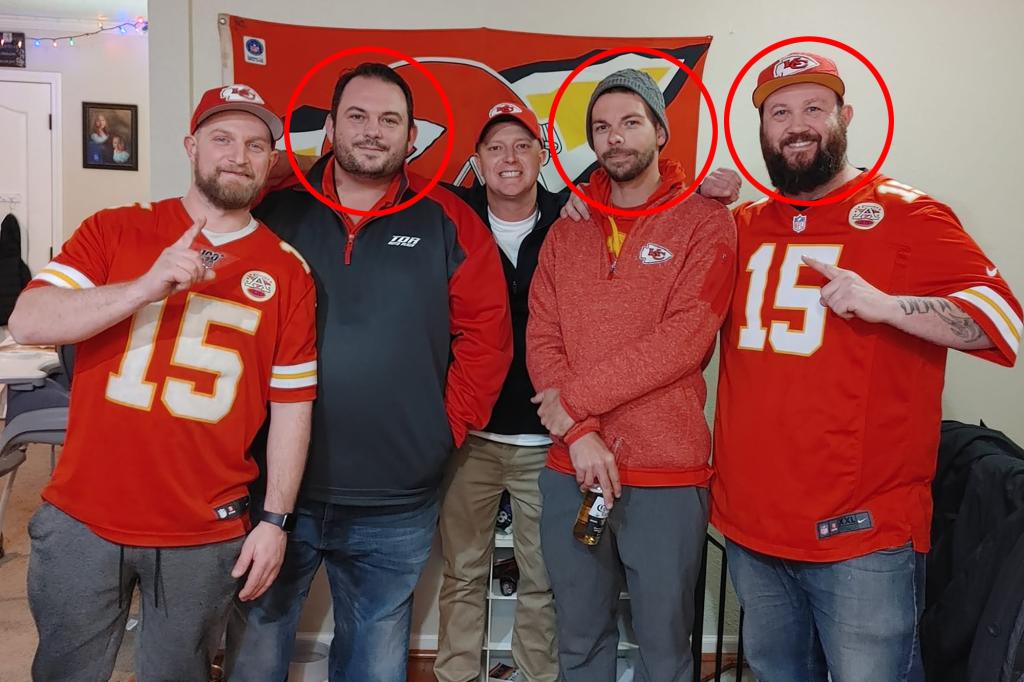Drugs a possibility in grisly Kansas City Chiefs fans’ freezing deaths outside home, doctor says
A doctor says it’s “plausible” that the three Chiefs fans who tragically died in their friend’s backyard on a freezing Kansas City night had been exposed to some kind of drug, contributing to their bizarre demise.
“It’s one thing for a person to tragically end up in a snowdrift after leaving a bar. But it’s a completely different story for three people to end up dead sitting on somebody’s back porch after a party,” Dr. Caleb Alexander, an epidemiologist with Johns Hopkins University, told The Post.
“The fact that there’s three individuals really heightens the curiosity and the tragedy of this case and, I think, increases the likelihood that something more than moderate amounts of alcohol were at play here,” he added.
In the baffling case, Clayton McGeeney, 36, David Harrington, 37, and Ricky Johnson, 38, were found dead and frozen solid in the backyard of their friend Jordan Willis’ house on January 9 — two days after the group had supposedly left after watching a Kansas City Chiefs game on January 7.
Police found the bodies after McGeeney’s fiancée requested a welfare check when he never returned home that Sunday and Willis failed to respond to inquiries and people calling at his door.
When police arrived, Willis reportedly answered with a wine glass in his hand and claimed he had no idea his friends were dead in his backyard.
Willis’ attorney, John Picerno, said his client had been sleeping near a loud fan and wearing noise-canceling headphones for two days as his friends’ families frantically tried to reach him and locate them.
Willis cooperated with police from the moment they became involved and they have said he is not under any suspicion, the deaths are not suspicious and no foul play is suspected.
Everything to know about the 3 Kansas City Chiefs fans who froze to death outside their friend's home
Three Kansas City Chiefs fans were found frozen to death in the backyard of their friend’s home on Jan. 9, where they had gathered to watch a football game.
The bodies of David Harrington, 37, Ricky Johnson, 38, and Clayton McGeeney, 36, had possibly been there for two days.
Jordan Willis, the man renting the home, insisted he had “no knowledge” of the fate of his friends.
Willis’ lawyer said the man was “asleep on the couch” for two days while his friends’ loved ones frantically tried to contact him.
“This case is 100% NOT being investigated as a homicide,” Kansas City police Capt. Jake Becchina told Fox News Digital.
Here’s more of The Post’s coverage of the tragedy in Kansas City:
- Kansas City Chiefs fan found dead did not use drugs, was ‘murdered,’ longtime girlfriend says
- House where Kansas City Chiefs fans partied has large windows facing yard where 3 froze to death
- 5th Kansas City Chiefs fan at party where 3 friends were later found frozen to death ID’d: report
- Parents of Chiefs fan found frozen to death alongside 2 friends in yard think trio was drugged, ‘dragged’ outside by scientist pal: ‘He concocted something’
- Drugs a possibility in grisly Kansas City Chiefs fans’ freezing deaths outside home, doctor says
Alexander, who specializes in drug use and safety, said the circumstances looked like the result of a dangerous combination of opioid-like drugs and alcohol to which they could have been “either intentionally or unintentionally” exposed.
“It certainly could be consistent with opioids, benzodiazepines, antihistamines, barbiturates, muscle relaxants,” he said, noting all he could do was speculate until toxicology reports came back.
“There are dozens of potential prescription drugs that when combined with alcohol could cause a level of sedation that would lead to ultimately freezing to death,” Alexander said, listing common drugs like Xanax and Ativan, Valium, and carisoprodol as possible culprits.
“Any of these with alcohol acts synergistically with many prescription drugs to increase their potency, and their potential to cause sedation and other adverse effects,” he added.
“One of the many tragedies of the opioid epidemic is that all too often people overdose and it can happen easily in groups as well as when people are solo,” Alexander said, pointing out a tragedy as recent as last week when musician Jose Vasquez died of a fentanyl overdose alongside his wife and a friend in their Los Angeles home.
Illicit opioids like fentanyl could also be on the table in the Kansas City case.
“That could account for three individuals rapidly losing consciousness and ultimately succumbing from the weather,” the doctor said, calling it “a very plausible scenario.”
However, he also added, “They didn’t necessarily have to die from the drugs … they could have just frozen, frozen to death.”
Temperatures were in the 30s on January 7 and 8.
If the three men were outdoors in that weather, unmoving for an extended time, Alexander said, they would be in serious danger of death.
“When you’re just sitting there, you are not generating any body heat … That’s darn cold. Plenty cold enough to die in, let’s put it that way,” he said.
Investigators have said they are “100%” not looking into the deaths as a homicide, even though the family of one the dead has made accusations that Willis — an HIV scientist with a background working in laboratories, according to a professional profile — poisoned his friends and left them to die.
Willis’ attorney called those claims “ridiculous,” and pointed out there had never been allegations of animosity between the friends.
Asked whether drugs might have been involved in the deaths, the attorney told The Post on Tuesday, “There’s a chance for everything.”
The Kansas City Police Department is awaiting the results of autopsies and toxicology reports, which Alexander said will be key to unraveling the mystery.
“The toxicology here is mission critical,” he said.

















